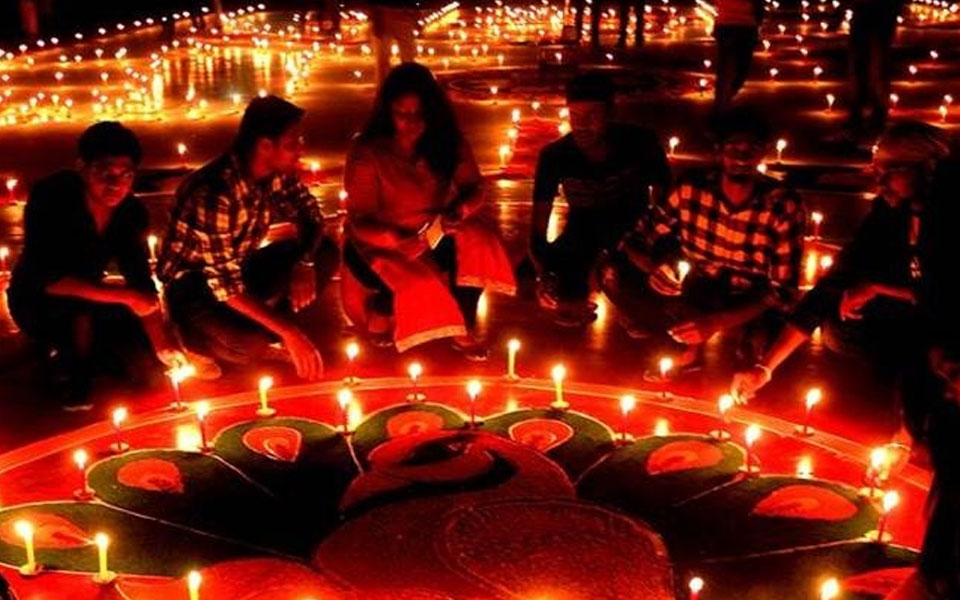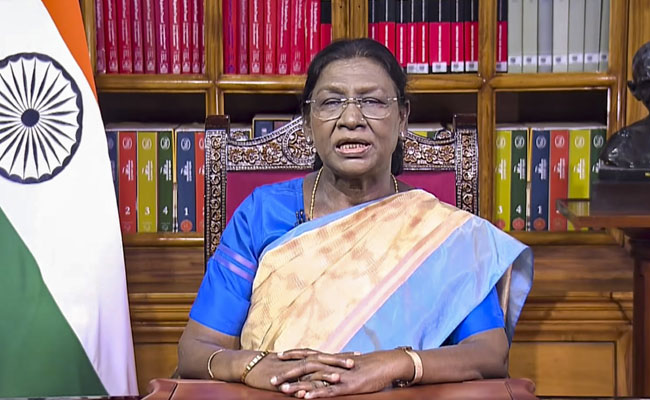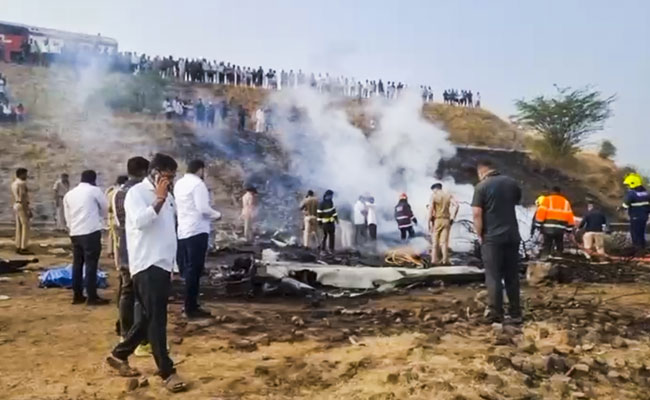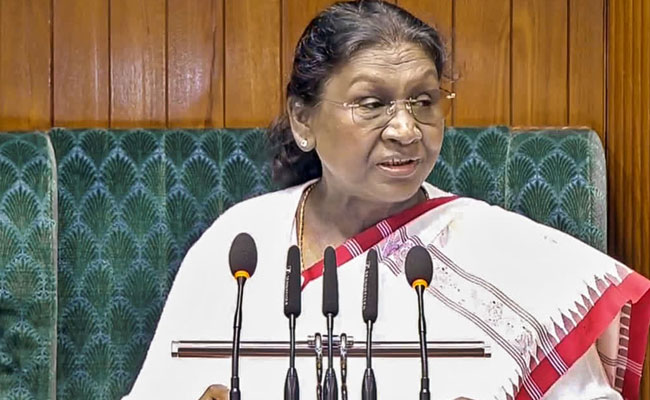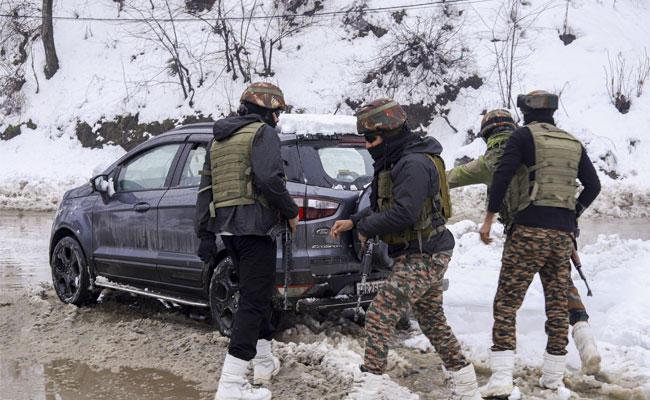Crackers have made a lot of noise in the supreme court as the festival of lights came close. Supreme Court has taken a tough stance against crackers this time. It has banned full time bursting of crackers by putting a time cap on this. And in cities like Delhi, crackers are totally banned. Air pollution in Delhi has reached alarming levels. Crackers have contributed to rising levels of air and noise pollution in the country per se. No sooner did the SC give it's verdict on this issue based on environmental concerns, Sangh Parivar and some political parties are making sounds louder than the crackers. They are deeming this as an attack on hindu dharma! They are carrying a message to people that there is a close link between crackers and festivals. Indian festivals share close bonds with nature and its cycles. Common people have been responding to the changing rhythms of nature by celebrating festivals. Agriculture is the main focus behind these festivals and they are celebrated accordingly.
Festivals are about worshipping air, water, river, soil, land, agriculture and basically everything that keeps the life going. With the interference of vaidika approach, these simple celebrations turned into traditions and turned against the spirit of nature. Let's take the case of rivers and lakes. They are the lifeline of the agrarian class. Hence they called them as mothers and goddesses. But the priestly class turned folklore into traditions. There is a difference between agraians calling the water bodies as gods and priestly class's inference as thus. Priests linked mythological stories to rivers such as Ganga and called her a goddess. They made people believe the dead would attain salvation of their bodies were disposed off in river Ganga. As a result of that, Ganga river is so polluted today that even if one spends thousands of crores the river cannot be cleaned up. The water cannot be consumed. Chauti is a festival celebrated by agrarian community who'd put together all the crop they had grown into the shape of Ganesha and worship it before it was consumed. This was their way of respecting the nature and expressing their gratitude for her gift of bounty.
Ganeshotsava today has been hugely politicised. It is now a public festival. Just one look at our lakes and rivers after Ganeshotsava can reveal where the celebrations have landed us. In the past, festivals taught us to respect the nature and be grateful for what we have received from her. But today, the same festivals are pushing us to abuse the nature. If authorities tell people not to immerse the idols in lakes, politicians instigate people telling them this is an assault on their religious freedom. They hide the fact that protecting and respecting water bodies is very much part of Indian tradition as much as celebrating a festival is. The name Deepavali itself is self descriptive. The festival is about celebrating the light and not the cantankerous sound. Mythology yields to Deepavali celebrated by the priestly class. But the folklore has different tradition to its rendering of the festival. Their festival does not come from mythology but from agriculture. They worship the harvest by placing lit lamps before them. This is the time when darkness has to end in the celebration of light. Prosperity enters home as a rich harvest.
The small live lamps heighten the spirit of Deepavali. Crackers only make noise. Much like our politicians and religious leaders’ speeches. Sound cannot eradicate the darkness inside our souls. It burns to make loud noises. That brightness never lasts long. After a cracker has died, the things that remain are darkness, dust and bad smell. None of them represent the Deepavali that we know, instead they represent whatever the festival seems to abhorr. For the same reason, it is important to light lamps than burst crackers on the occasion. That is like upholding the spirit of the festival.
There is also a practice of welcoming the prosperity and fruits of labour by lighting lamps. But when we burst crackers, we'd be reducing the prosperity to dust. Instead of sharing our richness with the poor in our neighborhood, we would be reducing money to nothing but ashes. We would be insulting goddess of wealth by doing this. And in the meantime, we'd also be polluting water, air and the environment around us. More than 200 children lose eyesight every year in our state alone, owing to crackers. Our festivals should end the darkness and fill our hearts with light. But owing to crackers, a lot of lives are being filled with permanent darkness. No one can blame the festival for this darkness that affects their lives forever. It has turned into a curse because we have chosen crackers over lamps.
Manufacturing crackers is a big business and a mega industry. People who make explosives are also part of this business. Miscreants are very much part of this racket. Which is why politicians and miscreants need these explosive manufacturing facilities to remain in existence. They need the front of Deepavali to run their businesses. This is exactly why we need to understand the spirit of the decision given by the Supreme Court and celebrate Deepavali more meaningfully to brighten up our homes and hearts.
Let the Truth be known. If you read VB and like VB, please be a VB Supporter and Help us deliver the Truth to one and all.
New Delhi (PTI): President Droupadi Murmu on Wednesday said the world saw the valour of Indian armed forces through Operation Sindoor when they destroyed terror camps on the strength of their own resources and asserted that any terror act will be responded with decisive action.
"India has proved that power can be used with responsibility and wisdom. The world has seen the valour and courage of Indian armed forces through Operation Sindoor," Murmu said in her address to both Houses of Parliament, marking the beginning of the Budget Session.
"Our nation, on the strength of our own resources, destroyed terror camps. My government sent a message that any act of terror will be responded to with resolute and decisive action," the President said, amid thumping of desks by Prime Minister Narendra Modi and other parliamentarians.
Murmu said the suspension of the Indus Water Treaty was part of India's fight against terror.
"We are also working on Mission Sudarshan Chakra to further strengthen national security," the President said, adding that security forces have also taken decisive action against Maoist terror.
Following Operation Sindoor, she said, the trust on Indian defence platforms has increased.
Murmu further said her government was committed to social justice in the country.
In the third term of the government, she said, work is being done to further empower the poor, and social security benefits are available to nearly 95 crore citizens now.
"My government is committed to true social justice," she said, adding that 25 crore Indians moved out of poverty in the last 10 years.
The President also said the government has been successful in tackling corruption and scams, and ensuring proper use of public funds.
"For India, the end of the first 25 years of this century has been filled with several successes, proud achievements and extraordinary experiences. In the last 10-11 years, India has strengthened its foundation in every sector," she said.
Lauding India's celebration of the 350th martyrdom day of the ninth Sikh guru, Guru Tegh Bahadur, and the country's tribute to revered tribal leader and freedom fighter Birsa Munda on his 150th birth anniversary, Murmu said, "when the country remembers the contribution of its ancestors, the new generation gets inspiration, which further speeds up our journey towards Viksit Bharat (Developed India)."
"The country celebrated the 350th Shaheedi Diwas of Sri Guru Tegh Bahadur Ji. During the 150th birth anniversary of Birsa Munda, the entire country paid him tribute and remembered his contribution to the tribal community," the President said.
"The events related to the 150th birth anniversary of Sardar Vallabhbhai Patel further strengthened the sense of Ek Bharat, Shresht Bharat (One India, Best India). The entire country became witness to how Bharat Ratna Bhupen Hazarika's birth anniversary celebrations filled the country with music and a sense of unity," Murmu said.
The President's mention of the Viksit Bharat – Guarantee for Rozgar and Ajeevika Mission (Gramin) (VB-G RAM G) scheme was met with loud protests from the Opposition benches.
Murmu said the VB-G RAM G initiative would provide guarantee for 125 days of work, would stop corruption and leakages, and provide a new impetus to rural development.
The Opposition members raised slogans demanding its rollback, even as the treasury benches thumped their desk in support of the scheme.
The President had to take a brief pause amid opposition cries of "vapas lo" (roll back) against the Act that replaced the Mahatma Gandhi National Rural Employment Guarantee Act (MGNREGA).
The Opposition parties have been demanding withdrawal of the VB-G RAM G Act and restoration of MGNREGA as a rights-based law in its original form, the right to work and the authority of panchayats.
The government has, meanwhile, claimed that the new Act will further strengthen the guarantee for rural employment.

